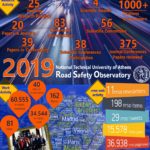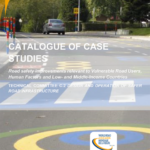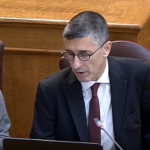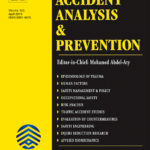|
|
|
|
|
|
The infographic of the 2019 NTUA Road Safety Observatory (www.nrso.ntua.gr)
highlights one more very intensive year, striving with highly
scientific expertise to improve road safety in Greece, in Europe and
worldwide. The nrso team with excellent dedication, efficiency and expertise were
active in 25 innovative research projects, succeeded to publish 59
scientific papers (20 in peer reviewed journals), and traveled at 40
cities in 4 continents to develop and promote their research, proud also
for the two Prince Michael Awards ( SafetyCube and SaferAfrica). In the new decade, we are even more committed to our scientific quest for safer roads everywhere and for all. 
|
|
|
|
|
Latest Developments
|
|
|
|
|
The World Road Association – PIARC recently published the Catalogue of Case Studies, containing a properly documented set of interventions designed, implemented and operated worldwide to improve road safety
in three specific fields: Vulnerable Road Users (VRUs), Human Factors
(HF) and interventions in Low- and Middle-Income Countries (LMICs). This
Catalogue is aimed to be enriched in the future with new case studies,
showing other applications, different solutions to solve the same
problems and better representing the safety interventions applied or
applicable in LMICs. 
|
|
|
|
|
|
|
|
The European Transport Safety Council (ETSC) has published the 38th PIN Flash Report “ How safe is walking and cycling in Europe?“, with the active contribution of NTUA.
This Report examines the most recent available data on the current
safety levels of cycling and walking across the EU and other countries
that provide data to ETSC as part of its Road Safety Performance Index
(PIN) programme, and it concludes with recommendations for action at
EU. It is highlighted that for a serious shift to walking and cycling,
particularly for local journeys in densely populated areas, the very design of urban spaces will need to change.
Motorised traffic will need to slow down when it comes into spaces used
by vulnerable road users; separated infrastructure and smart
intersection design will be essential; school streets without cars may
need to become the norm.  
|
|
|
|
|
|
|
|
The European Cyclists’ Federation (ECF) and the Global Alliance of NGOs for Road Safety with the support of FedEx released
a very interesting Guide containing good practices for supporting
community and non-government organisations (NGOs) advocating for safer cycling in European cities.
It is based on the experiences of the Netherlands and Denmark, two
countries that have developed significant expertise in the field of
cycling safety. Written in cooperation between the European Cyclists’
Federation, the Fietsersbond and the Cyklistforbundet,
this guide seeks to collate and advocate for the adoption of best
practice measures regarding road user behaviour, infrastructure design,
safe vehicles and the management of road infrastructure.  
|
|
|
|
|
Our Publications
|
|
|
|
|
|
|
The Transportation Research Board (TRB) 99th Annual Meeting was
held with great success in Washington, D.C., on 12–16 January 2020. The
meeting program covered all transportation modes, with more than 5,000 presentations in nearly 800 sessions and workshops,
addressing topics of interest to policy makers, administrators,
practitioners, researchers, and representatives of government, industry,
and academic institutions. A number of sessions and workshops will
focus on the spotlight theme for the 2020 meeting: A Century of
Progress: Foundation for the Future .  NTUA road safety presentations concerned:
|
|
|
|
|
|
|
|
The Greek Ministry of Infrastructure and Transport in cooperation with the partners of the European program CIVITAS SUMPs-UP
organized with great success a two-day event on 16 and 17 January 2020
on Sustainable Urban Mobility Plans (SUMP), in Athens. The purpose of
the event was to provide support
for the development of sustainable cities and to ensure accessibility
for pedestrians, bike users and all citizens. Road safety was a key component of the urban mobility discussions. NTUA actively contributed with the following presentation: Road Safety Measures for Sustainable Urban Mobility Plans 
|
|
|
|
|
|
|
|
The Greek Ministry of Development and Investment
organised with great success the National Conference on Growth for the
Partnership Agreement 2021-2027, which was held in Athens on 17 January
2020. The Conference for the upcoming period 2021 – 2027 marks the
official launch of the dialogue of all productive forces, social and
scientific bodies and policy makers. The aim is to formulate
strategic choices at National and Regional level for all the critical
development and socio-economic issues of the new period 2021-2027. Transport and road safety were key components of the discussions.   NTUA Professor George Yannis contributed actively with the following presentation: Critical challenges for a Sustainable National Transportation System  
|
|
|
|
|
|
|
|
The 1st newsletter of the Horizon 2020 project i-DREAMS ( Safety Tolerance zone calculation and interventions for driver – vehicle – environment interactions under challenging conditions) was rec ently
released highlighting the key activities of the first 8 months of the
project with the active contribution of NTUA. It contains the project
video, a closer look at the Safety Tolerance Zone concept and the
i-DREAMS prototype, the team behind this exciting project, the expert advisory board members and some publications and press releases.  Sign up here.
|
|
|
|
|
|
|
|
A paper titled “A systematic cost-benefit analysis of 29 road safety measures” authored by Stijn Daniels, Heike Martensen, Annelies Schoeters, Wouter Van den Berghe, Eleonora Papadimitriou, Apostolos Ziakopoulos, Susanne Kaiser, Eva Agner Breuss, Aggelos Soteropoulos, Wim Wijnen, Wendy Weijermars, Laurent Carnis, Rune Elvik, Oscar Martin Pere is now published in Accident Analysis & Prevention: Volume 133. Cost-benefit analyses were carried out for measures with favorable estimated effects on road safety and for which relevant information on costs are available, within the Horizon 2020 SafetyCube
project. The information on crash costs was based on data from a survey
in European countries and the results were assessed in terms of
benefit-to-cost ratios and net present value, providing highly useful
support to decision makers. 
|
|
|
|
|
|
|
Point of View
|
|
|
|
|
Data is a key support tool for developing evidence-based road safety policies. However, we are quite far from both disposing the right data and appropriately using them.
Today,
very often, we look where the data are and not where the problems are.
For example, we miss very critical information not only about risk exposure, like the time and distance travelled by pedestrians, cyclists and motorcyclists, but also about the Key Performance Indicators of
the road users, the infrastructure and the vehicles (speeding,
distraction, helmet use, vehicle fleet age, road maintenance).
Obviously, only crash data are not enough to identify neither the real
dimension nor the causes of road accidents. We claim working on road
safety problems, but we do not dispose a lot of critical information,
all over Europe. In a way, we work well in blind, driven rather by road
user impressions than by evidence.
Read the whole article...
|
|
|
|
|
Upcoming Events
|
|
|
|
|
E-Survey of Road Users’ Attitudes (ESRA2) is organizing the International Conference on Measuring Traffic Safety Culture which will take place on 1-3 April 2020, in Paris, France.
The Conference will focus on measuring traffic safety culture using
road users attitude metrics including new thematic reports on seat belt
& child restraint systems, automated vehicles, risk perception,
enforcement, cyclists, and elderly road users as well as first results
from sixteen new countries.  Conference registration is open at:  .
|
|
|
|
|
|
|
|
The next edition of the Transport Research Arena Conference (TRA 2020) organised by the European Commisison and the European transport research platforms ( ACARE, ALICE, CEDR, ECTP, ERRAC, ERTRAC, ETRA, Waterborne), will take place in Helsinki, Finland from 26-30th April 2020, themed “Rethinking transport – towards clean and inclusive mobility”.
Since 2006, TRA is the major European bi-annual transport research
event bringing together experts, authorities, industry and all
stakeholders to discuss on the newest innovations and the future of
mobility and transport and to foster a Europe-wide transformation in all
transport modes. 
TRA2020 full programme has now been published on the conference website
|
|
|
|

















Δεν υπάρχουν σχόλια:
Δημοσίευση σχολίου